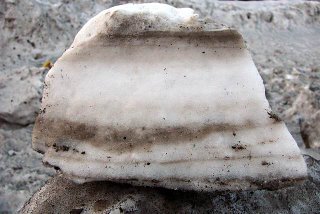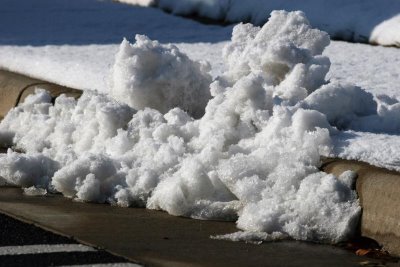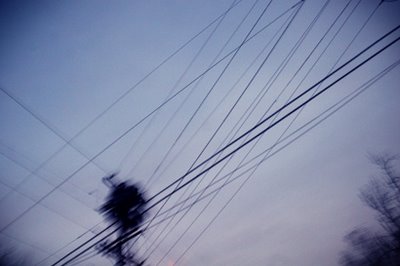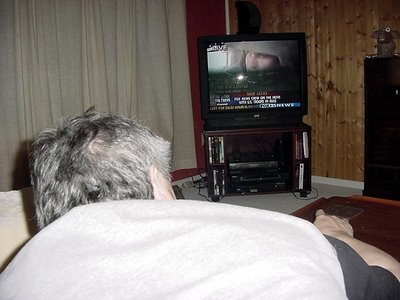 Part one of this short story appeared on July 11, 2006. We are delighted to have part two here. Watch for the conclusion here in a few days!
Part one of this short story appeared on July 11, 2006. We are delighted to have part two here. Watch for the conclusion here in a few days!By Meisha Rosenberg
Miriam looked at Rivka and noticed she wasn’t so mousy after all—she had a sturdy appearance and wore leather shoes, the kind you tied, the kind Miriam knew would get Rivka teased. As they exited the schoolyard gate, Miriam felt her cotton knee-high socks—bright red, to match her red-and-white striped shirt—slipping down her bare calves under her skirt. Her legs were cold. She found a block of dirty ice on the ground and kicked it forward with the toe of her shoe. Rivka appeared not to notice.
Miriam caught up to the ice chunk and kicked it again. Each kick made her socks slip down more. The ice chunk skidded to the side, under the bushes of someone’s lawn—and Miriam doggedly sought it out. It landed in the street, and Miriam got down to kick it back up from the gutter to the sidewalk. Each time she kicked it, more ice broke off, until the piece became smaller and smaller.
"Do you have brothers or sisters?" Miriam asked.
"No," Rivka pronounced the word carefully, emphasizing its roundness.
"I have two brothers. I don't like having brothers. It must be nice to be the only child. How come your parents didn't have other children?"
"I don't know....No foods."
"Oh, you mean it costs too much to feed them?"
"Da, yes." Rivka's face opened when she said "da," and Miriam could picture her back in Russia, speaking fluently and laughing with her friends. It was as if, when Rivka spoke Russian, she had a whole different personality, a more spontaneous one.
"Do you like not having brothers or sisters?"
Rivka merely shrugged.
 As Miriam kicked the ice, she thought about how her two older brothers were probably already home, and she didn’t like that—their rowdiness, like dirty monkeys. The day before she had come home to the sight of Simon, her twelve-year-old brother, trying to sled down a dirt-encrusted pile of hard snow.
As Miriam kicked the ice, she thought about how her two older brothers were probably already home, and she didn’t like that—their rowdiness, like dirty monkeys. The day before she had come home to the sight of Simon, her twelve-year-old brother, trying to sled down a dirt-encrusted pile of hard snow. The pile had been there for a month, and was really no more than ice, shaped in a wedge, like the freeze cones they sometimes got at the corner store, but every pore
 of it was plugged with grey dirt. It wasn’t any particular type of dirt that Miriam could identify: not earth dirt, not dust dirt, nor car exhaust. Just the fine, greyish-brown powder that everywhere caked the ice and the snow clinging to the curbs, moulding to the odd shapes of neglected cracks and corners.
of it was plugged with grey dirt. It wasn’t any particular type of dirt that Miriam could identify: not earth dirt, not dust dirt, nor car exhaust. Just the fine, greyish-brown powder that everywhere caked the ice and the snow clinging to the curbs, moulding to the odd shapes of neglected cracks and corners. Simon giggled self-consciously while he tried to slide, because he wasn't really enjoying himself. Walker, her younger brother, antsy with waiting for his turn, had grabbed a piece of dirty snow and thrown it at Miriam, missing her by three feet as she passed up the walk, her ankles unsteady on the broken, iced surface.
If she could somehow get Rivka to come home with her, her brothers might be nicer. Miriam sidestepped a fire hydrant to seek out the last remnant of her ice chunk. She kicked hard, and it disintegrated into ice crumbles.
Rivka, stoic, looked up at the sky, and Miriam tried to imagine what Russia was like. It was only 3:30 p.m., but the sky had already taken on the bright blue haze of a winter evening.
 There were no stars yet: Miriam wondered if they had stars in Russia, and if they were the same.
There were no stars yet: Miriam wondered if they had stars in Russia, and if they were the same. They walked on the sidewalk of a main road, and cars sped by, their wheels kicking up broken glass and dirty snow, their engines ticking and gasping. No one else was on the street except for the two girls. They passed by the convenience store where Miriam remembered going a few times with her mother. Above it loomed a billboard that read, Troy, New York—Home of Uncle Sam!
"Do you get an allowance?" asked Miriam. Rivka looked at her quizzically. "Money, do your parents give you dollars?"
"Nyet. No dollars."
Miriam considered stopping in the convenience store, with the 50 cents she still had from allowance, but then noticed the darkness inside and the closed sign on the door. As they walked on she saw, under the streetlight, that Rivka had the most beautiful honey-brown hair with streaks of fine gold. She wanted to see Rivka's round, strong face open up again, see her friendly mouth say "Da." Miriam pointed at the Uncle Sam billboard saying, "Uncle Sam. Do you know him?"
"Uncle Sam," Rivka read, obediently. "No."
"He’s an American, and that’s the flag," Miriam explained.
Rivka said "Ah, America!"
"But he’s ugly, isn’t he? That’s what my dad says," added Miriam. "My dad, he works hard." Rivka said nothing, so Miriam continued. "He likes to watch TV. Copland. Do you like that show?"
Rivka tilted her head to one side again, not understanding. Miriam loved the way she tilted her head, like a bird on a branch way up high.
Miriam wondered how she might explain her fierce pride for her father. He came home weekdays at 8 and started drinking, smelling of gasoline and cigarette smoke. He stopped at 10, when he fell asleep in front of the TV.
 Miriam liked to sit by his feet.
Miriam liked to sit by his feet. He was short, had a punched-in looking face, and shaggy, curly hair. "Hush," her mother cautioned, "don't disturb daddy when he's worked all day." Miriam didn't need to be told. When her father was around, Miriam could relax. Unlike when Miriam first arrived home from school, and her mother asked the same question, always behind a tense expression and a disappointed gritting of her teeth: "How did your day go?"
Her mother's face was soft, prematurely aged, and framed by the dirty-blond hair that, although permed, was the same as Miriam's. Her mother was rotund and had wrinkles on her forehead, watery brown eyes, and squarish, fleshy cheeks that Miriam kissed every night before bed.
"I did my work, and then during recess Sheila stepped on my toe, hard, and so we went to the principal's office together. Otherwise, it wasn't so bad," she had said just yesterday. Miriam couldn't help telling the truth, no matter how many times she suffered for it. "How many times have I told you, don't get involved!"
Her mother didn't go on, as she sometimes did, but instead made Miriam do all the dishes in punishment. Her mother went upstairs, and while Miriam washed the dishes, her brothers shot waterguns across the kitchen, shouting and shoving Miriam as they dove onto the floor.
But when her father was home, the only sound, besides the sirens and rap music of Copland, was her father occasionally grasping the aluminum can and gulping, three swallows in a row, then placing it gently on the wooden armrest of his chair. This was the only time Miriam could dream. She dreamt of being a fighter pilot, and sometimes of being a cop. She'd heard that women could do these things now. She'd watched a movie with her dad once about a female fighter pilot.
Her father turned down the volume during commercials using the remote control.
 The light from the television flashed blue and white in the dark room as she played with her dolls on the floor. She liked to cut their hair, paint their nails, take off the stuffy clothes they came in. Dolls, she felt, were meant to be naked. Her mother would yell at her to put clothes on her dolls, but her dad never did.
The light from the television flashed blue and white in the dark room as she played with her dolls on the floor. She liked to cut their hair, paint their nails, take off the stuffy clothes they came in. Dolls, she felt, were meant to be naked. Her mother would yell at her to put clothes on her dolls, but her dad never did.Miriam said as clearly and slowly as she could, "My dad, father, he works for the gas station. He works really hard—I see him at night. What about your parents?"
"My parents, they work." Rivka looked down.
"Both of them?"
"Yes."
Miriam wondered what it would be like to have both parents work: the house would probably be quiet. But maybe Rivka got lonely.
“Do you miss Russia?” she asked. Rivka stopped in her tracks and gave Miriam a quizzical look.
"Yes. Yes, I am from Russia."
"No. Do you miss it?" Miriam said slowly.
"I don't understand."
“Do you like it? Like Russia?”
"Yes," Rivka finally understood, "I like Russia. I love America," she said, as though she were imitating someone.
"Why? Why America?"
"Freedom. It is freedom." Rivka's face was as blank as the winter sky, with the same fading radiance. Miriam was desperately trying to get some connection, some response from her.
"What do you like to do? I like to go ice skating, at the Burnt Hills Lake."
"Ice. Yes."
"Would your parents let you go? My parents don't let me go anywhere they don't know."
"Go anywhere...I don't understand." Her pout was too cute, her head nodded too emphatically in confusion. Miriam wondered if Rivka was only pretending not to understand.
"You know, what do your parents allow? How late can you stay up? What's your bedtime?"
"Ah, bed...bed at eight thorty."
"Thirty," said Miriam.
"Threety. Theerty." Rivka kept smiling—in derision?
Miriam noticed that the Russian girl's teeth were a seaweedy yellow and crooked.

Miriam’s heart sank, as she thought of what Brian would make of this. And of what all the girls, with their hair mousse cans and peeing contests in the bathroom, would say to Rivka. Miriam could hear their cackling in her ears.
“Want something to drink, Rat-killer?” they’d say as they peed and made Miriam wait, the last in line. They left the toilet unflushed, they stole her barettes right off her head, they left gum on her chair. But that wasn't the worst of it. The worst part was the loneliness. And now that Rivka was here, it was so important she understand these things, because maybe they could help each other.
Meisha Rosenberg is a writer and teacher living in Troy, New York. She holds an MFA from New York University.
No comments:
Post a Comment